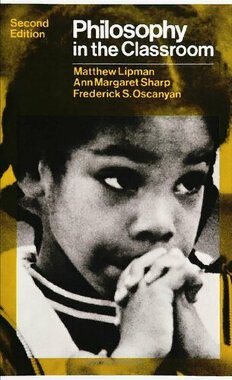
Philosophy in the Classroom PDF
Preview Philosophy in the Classroom
Philosophy in the Classroom Copyrighted Material Copyrighted Material Philosophy in the Classroom Second Edition Matthew Lipman Ann Margaret Sharp Frederick S. Oscanyan Temple University Press Philadelphia Copyrighted Material Temple University Press, Philadelphia 19122 © 1980 by Temple University. All rights reserved Published 1980 Printed in the United States of America Library of Congress Cataloging In Publication Data Lipman, Matthew. Philosophy in the classroom. Bibliography: p. I. Curriculum planning. 2. Education-Philosophy. /. Sharp, Ann Margaret, 1942- joint author. II. Oscanyan, Frederick S., joint author. III. Title. LB1570.L57 1980 370'.1 80-12157 ISBN 0-87722-177-4 ISBN 0-87722-183-9 (pbk.) Photographs: Joseph B. Isaacson Portions of Chapter I first appeared in The Social Studies, published by Heldref Publications, Washington, D.C., and are reprinted by permission. Chapter 4 is reprinted by the permission of the publisher from The Oxford Review of Education 4, no. I (1980). Copyrighted Material Contents Preface Xl I. Encouraging Children to Be Thoughtful 1. The Need for Educational Redesign 3 Educational Dysfunction 3 Failure of Remedial Approaches 4 Meeting Expectations 5 Discovery 6 Frustration 7 Meaningful Experiences 8 Need for Adventure 9 Meaning versus Rationality II 2. Thinking and the School Curriculum 12 The Child's Hunger for Meaning 12 Thinking Skillfully 13 Thinking Skills and Basic Skills 16 Reading to Find Meanings 16 Reasoning as a Foundational Skill 18 Thinking Skills and Other Academic Disciplines 20 The Relationship between Dialogue and Thinking 22 Thinking Well about Things That Matter 25 3. Philosophy: The Lost Dimension in Education 31 Philosophy Begins in Wonder 31 Wonder and Meaning 32 Scientific Explanation 33 Symbolic Interpretation 34 Philosophical Investigation 36 Metaphysical Questions 36 Logical Questions 38 Ethical Questions 39 v Copyrighted Material Contents VI 4. Some Educational Presuppositions of Philosophy for Children 41 Preserving the Integrity of Philosophy as a Discipline 43 Converting the Classroom into a Community of Inquiry 45 Preparing the Teacher and the Curriculum 46 II. Aims and Methods of Philosophy for Children 5. The Philosophy for Children Curriculum 51 Description of Curriculum 51 Aims and Objectives of Philosophy for Children 53 Improvement of Reasoning Ability 54 The Origins of Reasoning 54 Reasoning in Childhood 57 Reasoning and Inference 62 Development of Creativity 64 Personal and Interpersonal Growth 65 Development of Ethical Understanding 66 Development of the Ability to Find Meaning in Experience 67 Discovering Alternatives 68 Discovering Impartiality 69 Discovering Consistency 71 Discovering the Feasibility of Giving Reasons for Beliefs 73 Discovering Comprehensiveness 74 Discovering Situations 75 Discovering Part-Whole Relationships 77 6. Teaching Methodology: Value Considerations and Standards of Practice 82 Getting Children to Think for Themselves 82 Conditions for Teaching Philosophical Thinking 84 Commitment to Philosophical Inquiry 84 Avoidance of Indoctrination 85 Respect for Children's Opinions 87 Evocation of Children's Trust 88 Teaching Behavior Conducive to Helping Children Engage in Philosophical Thinking 89 Maintaining Relevance 90 Questioning 92 Answering 97 Listening 98 Copyrighted Material Contents vii Non-verbal Teacher-Student Communication 99 The Teacher as the Child's Model 100 7. Guiding a Philosophical Discussion 102 Philosophy and the Strategies of Dialogue 102 Guiding a Classroom Discussion 104 The Role of Ideas in a Philosophical Dialogue 106 Scientific Discussions 106 Discussions about Religious Beliefs 106 Philosophical Discussions 108 How Is Philosophy Related to Science Education? 109 Fostering Philosophical Dialogue 110 Discussions, Good Discussions, and Philosophical Discussions 110 Drawing Students Out ll3 Eliciting Views or Opinions ll3 Helping Students Express Themselves: Clarification and Restatement ll4 Explicating Students' Views ll5 Interpretation 115 Inferring Logical Implications ll6 Inferring What Is Suggested ll6 Seeking Consistency 117 Requesting Definitions 1I8 Searching for Assumptions ll9 Indicating Fallacies 120 Requesting Reasons 121 Asking Students to Say How They Know 122 Eliciting and Examining Alternatives 123 Orchestrating a Discussion 124 Grouping Ideas 126 Suggesting Possible Lines of Convergence or Divergence 127 Moving Discussions to Higher Levels of Generality 128 III. Applying Thinking Skills to School Experience 8. Encouraging Children to Be Logical 131 Formal Logic as an Aid to Philosophical Thinking 131 Copyrighted Material viii Contents How Can Formal Logic Help? 131 Why Syllogistic? 133 Relevant Properties of Formal Systems 135 Consistency 135 Logical Consequence 135 Coherence 137 Ages and Stages: Why Syllogistic between Ten and Fourteen? 138 Giving Reasons: The Good Reasons Approach 138 Types of Inferences 139 Characteristics of a Search for Reasons 141 Characteristics of Good Reasons 143 Teaching Good Reasons Logic 144 Acting Rationally 146 Role Models: Styles of Thinking 147 Guides for Reasonable Behavior 148 Conclusion 151 9. Can Moral Education Be Divorced from Philosophical Inquiry? 153 The Presumption of Rationality 153 Setting the Stage for Moral Growth 154 Socialization and Autonomy in Moral Education 157 Dangerous Dichotomies in Moral Education 159 What to Do to Help the Child Know What to Do 165 Imagination and Moral Education 166 Imagining Means-End Connections 168 Imagining Part-Whole Connections 168 The Role of Models in Moral Imagination l70 Where to Begin l71 Why Moral Education Cannot Be Divorced from Philosophical Education 172 The Relationship between Logic and Morality 178 The Improvement of Moral Judgment 183 10. Philosophical Themes in Ethical Inquiry for Children 188 The Relation of Logic to Ethics 190 Consistency 191 The Right and the Fair 193 Perfect and Right 194 Free Will and Determinism 195 Natural 196 Change and Growth 197 Copyrighted Material Contents IX Truth 198 Caring 199 Standards and Rules 200 Questions and Answers 201 Thinking and Thinking for Oneself in Ethical Inquiry 203 Appendix A. The Reform of Teacher Education 207 Appendix B. Experimental Research in Philosophy for Children 217 Bibliography 225 Copyrighted Material
